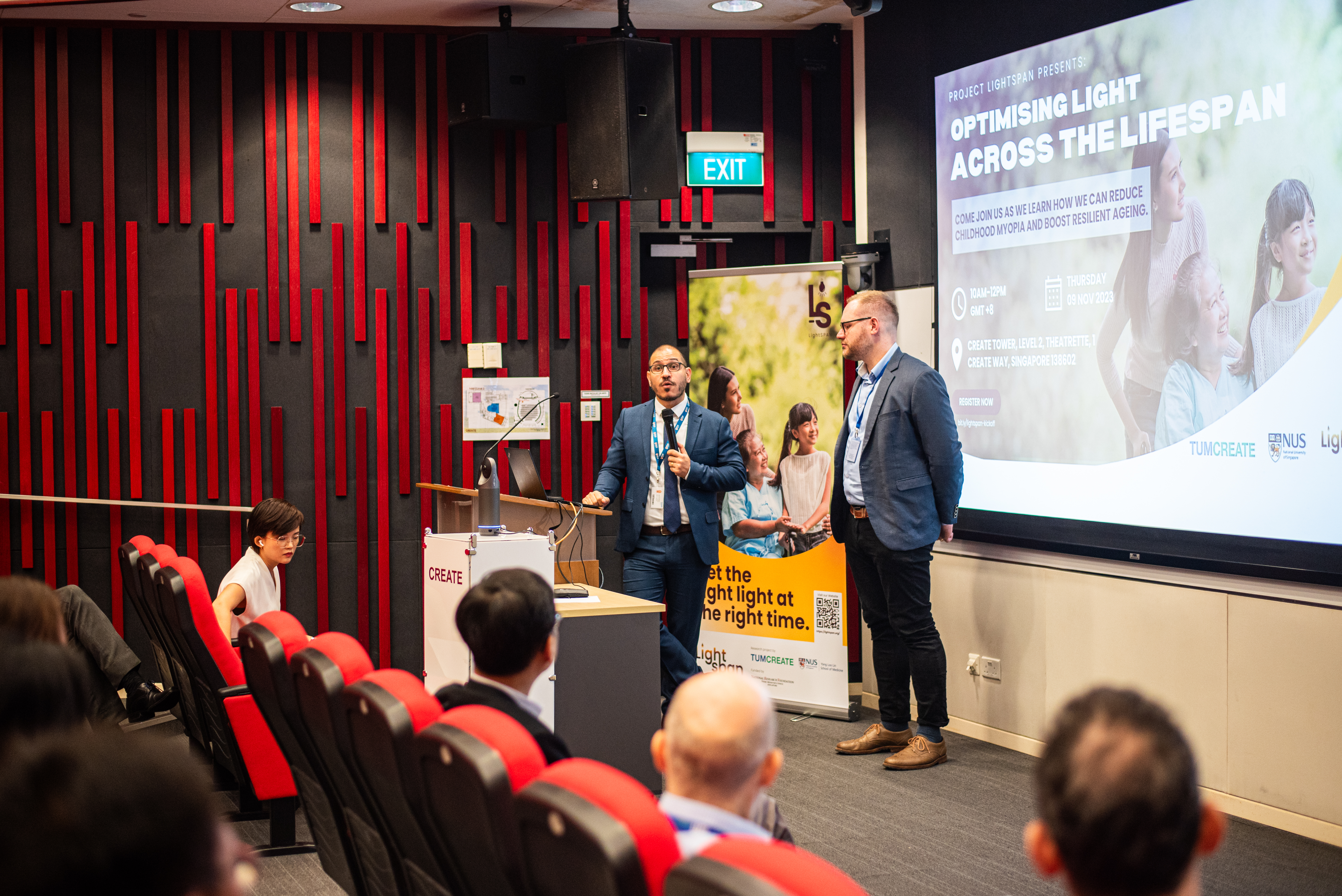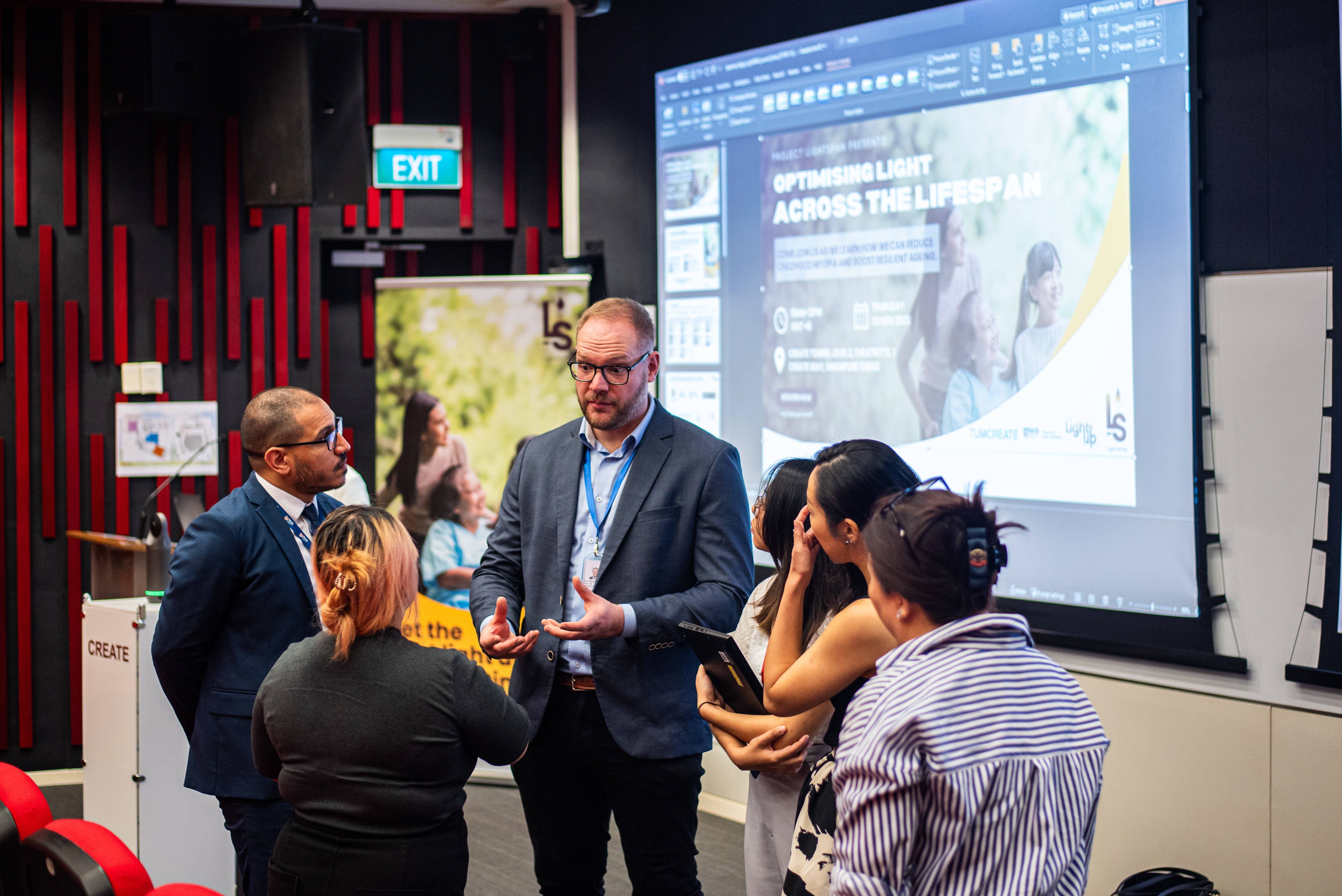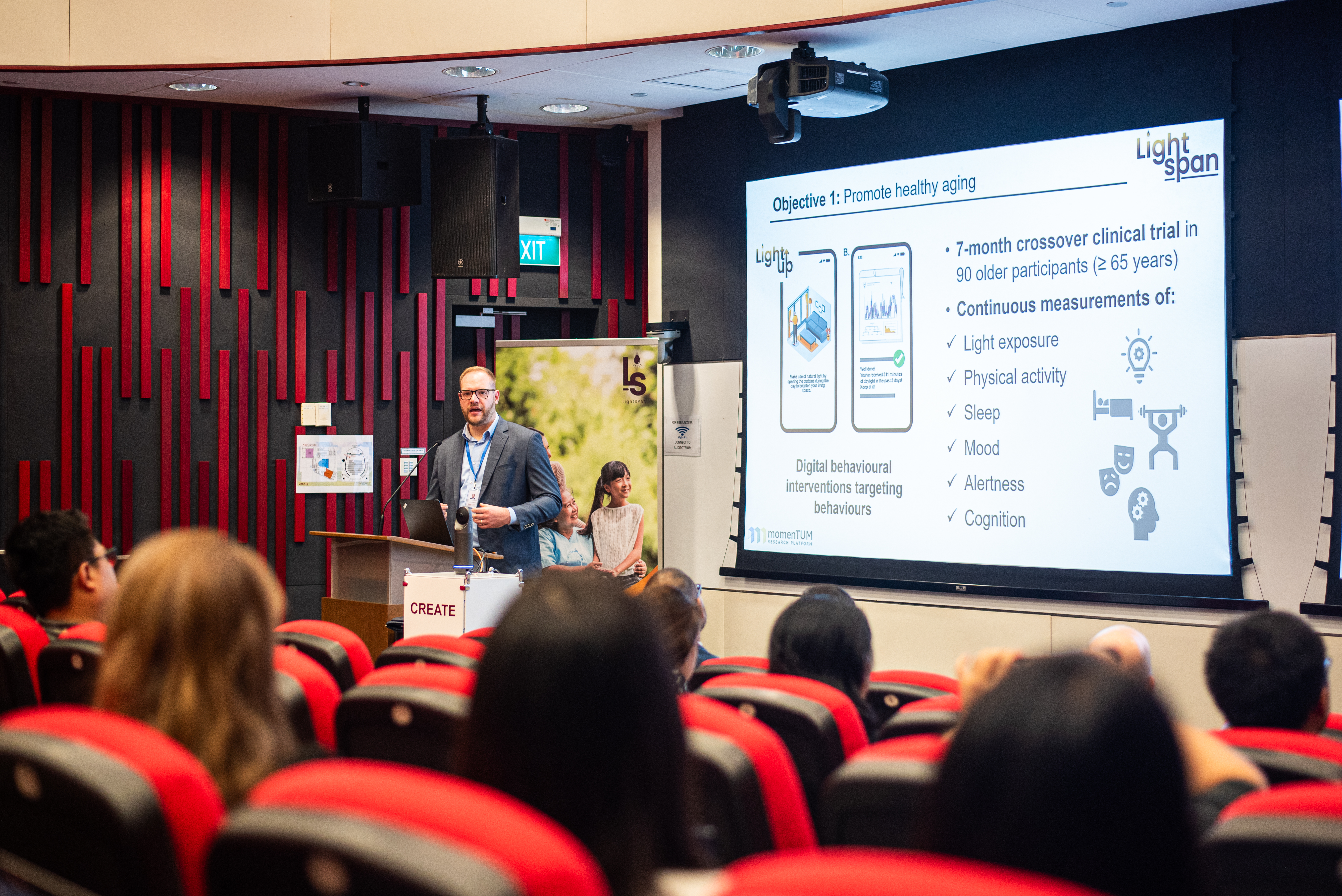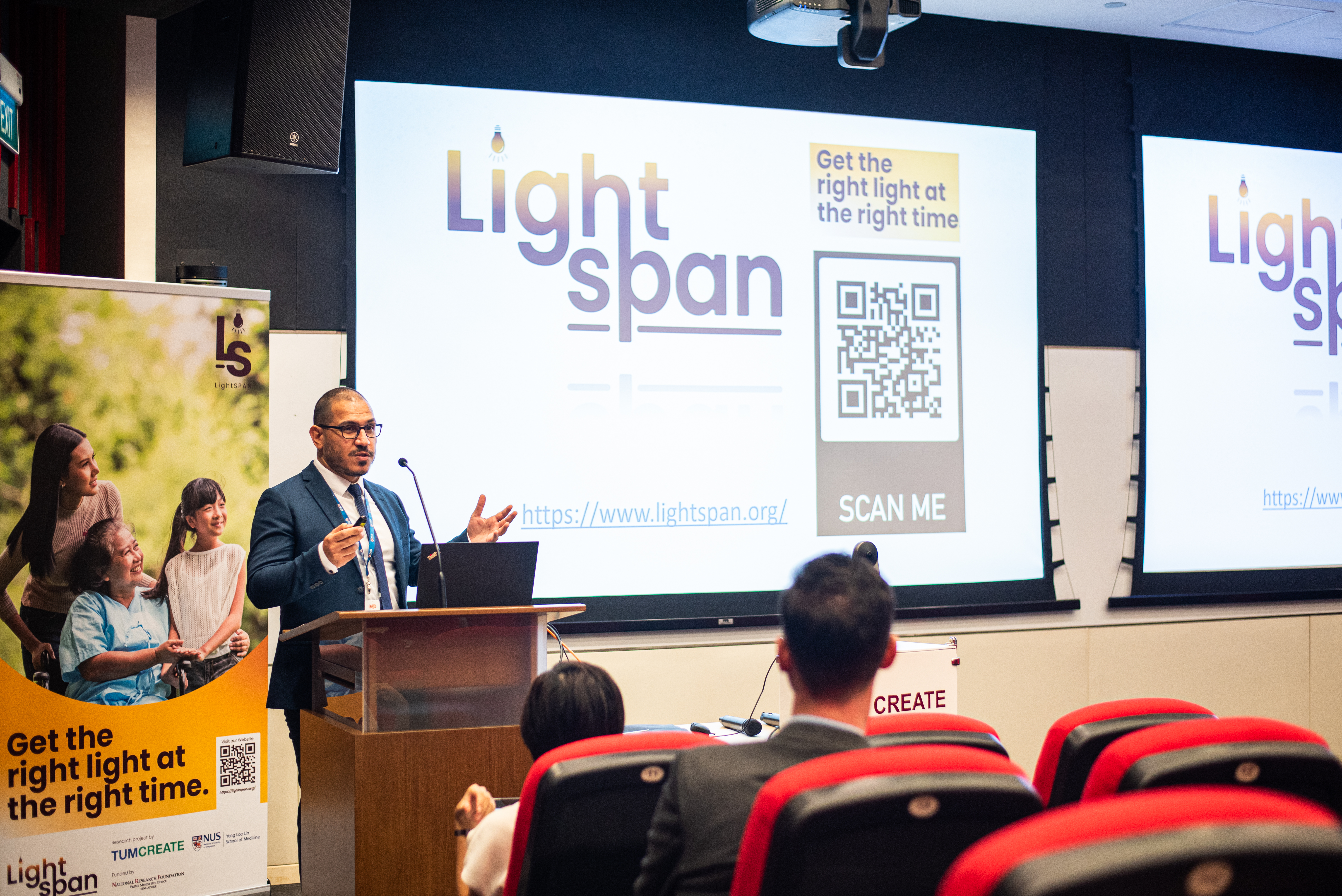- AquaCycle
- Proteins4Singapore
- Singapore's Pathway to Carbon Neutrality
- CellFACE
- LightSPAN
- Computational Modelling Group
- Energy and Power Systems Group
- SITEM - Singapore Integrated Transport and Energy Model
- MoVES (Mobility in Vehicular Environments at Scale) lab
- Projects
News
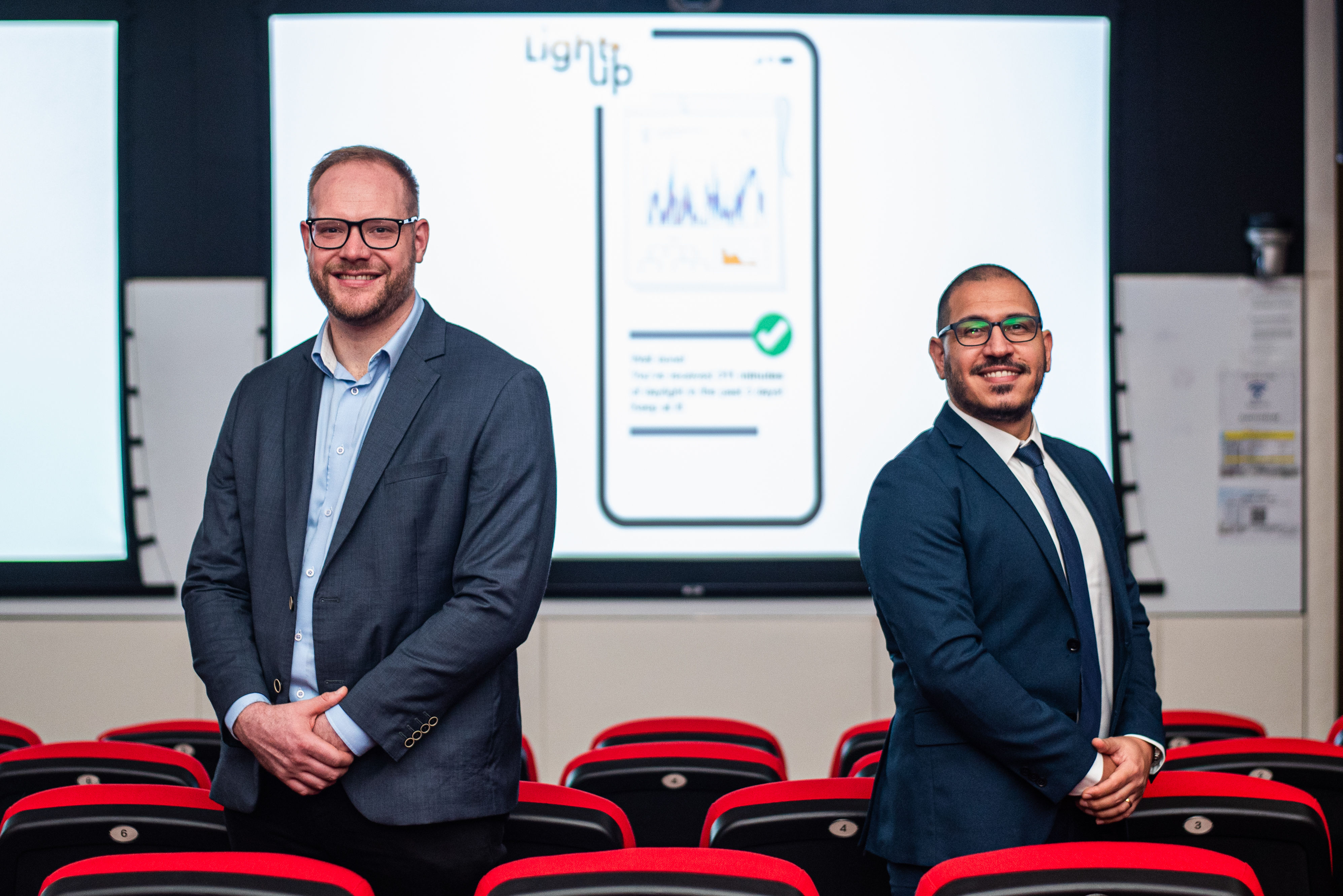
Reducing Childhood Myopia, Boosting Resilient Ageing Through Novel Light Exposure App
The multi-disciplinary research project “LightSPAN”, led by TUMCREATE and the Yong Loo Lin School of Medicine, National University of Singapore (NUS Medicine), aims to optimise light exposure in primary school children and seniors through a custom-built, behaviour-changing application for individuals to take a proactive and preventive care approach. 09.11.2023- Light has a profound influence on human health, cognition and well-being. In turn, light at the wrong time, or insufficient light exposure, can have significant negative health effects.
- The optimisation of exposure to daily light can lead to healthier eye and brain development.
- The multi-disciplinary research project “LightSPAN”, led by TUMCREATE and the Yong Loo Lin School of Medicine, National University of Singapore (NUS Medicine), aims to optimise light exposure in primary school children and seniors through a custom-built, behaviour-changing application for individuals to take a proactive and preventive care approach.
- The LightSPAN research project has a two-pronged approach to prevent myopia in childhood and adolescence and promote healthier and more resilient ageing, which ties in perfectly with “Healthier SG”.
- It aims to leverage behaviour-change interventions as a key strategy to empower parents to take charge of their children’s eye health and older individuals to take charge of their health.
Thursday, 09 November 2023 – TUMCREATE, a multidisciplinary research platform of the Technical University of Munich (TUM) in Singapore, and the Yong Loo Lin School of Medicine, National University of Singapore (NUS Medicine), kick off a new research project that examines the efficacy of optimising light exposure to reduce myopia prevalence among school-going children and promote resilient ageing through a novel smartphone-delivered behaviour-changing programme. This multi-disciplinary research project will lead to the rollout of an individually tailored, low-intensity behaviour-modification programme delivered through the smartphone application “LightUP”. The app empowers parents to ensure that their children get the right light at the right time to prevent myopia, and senior citizens to improve sleep quality, cognition, alertness and mood.
This non-invasive programme leverages individual behaviour as the key strategy to empower individuals to take a proactive role to enhance their eye health, sleep, alertness, cognitive functioning and mental well-being. Additionally, LightSPAN will look into testing and establishing evidence-based lighting designs and policy recommendations for myopia-safe classroom lighting.
Light: a key influencer on human health, cognition and well-being
Studies have revealed that light has a profound influence on human health, cognition and well-being. Exposure to bright light has also proven to provide strong benefits in reducing cognitive decline in dementia. The use of high-intensity light, sunlight or blue-enriched white light has also shown to stimulate the melanopsin system – the neurobiological pathway that supports normal circadian rhythms, which helps improve sleep quality, alertness, cognition and mood – functions that change with increasing age.
In Singapore, the ageing population comprised 17.6 per cent of the total population (in 2021) and is projected to increase to 23.8 per cent by 2030. In response to the increasing ageing population and rising healthcare costs, Singapore has rolled out the national healthcare reform – Healthier SG – to shift the national healthcare strategy from treatment to prevention.
Amid the challenges of coping with an ageing population, Singapore is also simultaneously grappling with a high prevalence of myopia (near-sightedness), with more than 80 per cent of young adults in Singapore affected by the condition. In addition to its very high socio-economic burden, high myopia, which affects nearly three per cent of the world population, can lead to irreversible vision loss. Without adequate interventions, myopia is projected to affect 50 per cent of the world population by 2050, with over one billion individuals with high myopia, making myopia the leading cause of irreversible blindness worldwide. While regular outdoor exposure and exposure to bright light (e.g., sunlight) remains a robust behavioural preventive measure to reduce the incidence of myopia, the implementation remains a challenge for working parents to gauge outdoor time and optimise time spent outdoors in bright light for their children.
LightUP: a smartphone application to optimise light exposure for resilient ageing and myopia prevention
The LightSPAN project will leverage behaviour as its key intervention strategy and examine its efficacy by targeting two key life stages – childhood and adolescence and late adulthood to optimise light exposure through the innovation of the smartphone application “LightUP”.
Using data collected by a novel, wearable light sensor measuring visible and ultra-violet (UV) light exposure, the LightUP mobile app will provide personalised feedback for the user by presenting visualisations of light exposure throughout the day, showing long-term trends in light exposure and sending daily notifications to encourage the user to modify and adapt their behaviour to improve circadian rhythms, alertness, mood and cognition.
Professor Manuel Spitschan, from TUMCREATE and co-Principal Investigator of the LightSPAN project, said, "As of now, there are no established guidelines or recommendations for healthy light exposure for senior citizens in Singapore or globally. With preventive care and mental well-being taking centre stage in how people manage their health, the research project aims to empower users to take a proactive approach to take care of their well-being by leveraging light exposure, which is an element that is available in abundance to ease age-related alterations in sleep, cognition, alertness and mood. With the widespread usage of smartphones among Singaporeans, adopting the LightUP application certainly presents a scalable potential for nationwide adoption of the app to deliver low-threshold behavioural intervention to get the right light at the right time."
The app will also provide quick and easy access, transfer and tracking of light exposure details and nudges whenever additional light exposure is needed so that parents can effectively monitor and optimise their children’s light exposure. Assistant Professor Raymond Najjar, from the Department of Ophthalmology at NUS Medicine and co-Principal Investigator of LightSPAN project, said, “Children today are experiencing insufficient outdoor and natural sunlight exposure, a concerning trend that is contributing to the alarming increase in childhood myopia. The younger the age of myopia onset, the higher the risk of myopia and associated sight-threatening conditions during adulthood. We need to stop or at least delay the onset of myopia in children. Recognising the pivotal role that outdoor exposure and natural sunlight play in reducing myopia risk, the LightSPAN project aims to introduce innovative, evidence-based strategies for myopia prevention. Through wearable light sensors, coupled with the LightUP mobile app, our initiative will empower parents to monitor their children's light exposure and support them in cultivating healthier daily light exposure habits to safeguard against myopia.”
Shift from reactive, illness-oriented care to preventive care
With a growing focus on patient interaction with health management as part of the global shift from providing reactive, illness-oriented care to preventive care, a growing body of mobile apps are developed to deliver behavioural health intervention and adopt healthier lifestyle habits in pursuit of better health outcomes. Digitally-enabled health applications are increasingly adopted by patients, providing a window of opportunity to improve public health outcomes. Basic intervention strategies such as sending of text reminders have been reported to increase the odds of medication adherence and reduce the frequency of missed appointments.
The research complements the nation's efforts to create an integrated and technology-driven healthcare ecosystem that extends beyond providing clinical support to social and mental support by drawing the use of mobile phones to deliver a non-invasive, low-threshold behaviour-changing programme that empowers elderly individuals to take a proactive approach in adopting a healthy light exposure lifestyle to promote a healthier eye development and improve cognitive functioning and mental well-being across the lifespan.
To ensure successful translation of research outcomes, the research team will work with local health and education agencies such as the Ministry of Education, the Ministry of Health Office of Healthcare Transformation, the Ministry of Health Ageing Planning Office, and the Health Promotion Board to generate key data to establish evidence-based design recommendations and guidelines for optimal light exposure in and outside of classrooms for myopia prevention, but also guidelines to promote physical, mental and emotional health and well-being in Singapore.
The new research project, funded by the National Research Foundation (NRF), is led by Professor Manuel Spitschan, from the Technical University of Munich and Research Group Leader at the Max Planck Institute for Biological Cybernetics, and Assistant Professor Raymond Najjar, Deputy Research Director from the Department of Ophthalmology at NUS Medicine.
About TUMCREATE:
Founded in 2010, TUMCREATE is a multidisciplinary research platform fostering bilateral research exchanges between the Technical University of Munich (TUM) and world's leading universities, local institutions, and public agencies as well as industry partners from the region to contribute to the sustainable transformation of societies through science and technology. Funded by the National Research Foundation, TUMCREATE's multi-faceted research projects span topics from urban mobility, food science and technology, biomedical technology and preventive care to solutions for a carbon-neutral megacity. Over the last years, the research teams presented more than 1,000 publications, with more than 70 doctoral students qualified for a career in research and industry. These achievements and the strong rapport established with its international partners reflect the institution's high-quality research output and scientific impact.
Website: https://www.tum-create.edu.sg
Facebook: https://www.facebook.com/TUMCREATE
LinkedIn: https://www.linkedin.com/company/tum-create-limited
About National University of Singapore (NUS)
The National University of Singapore (NUS) is Singapore’s flagship university, which offers a global approach to education, research and entrepreneurship, with a focus on Asian perspectives and expertise. We have 16 colleges, faculties and schools across three campuses in Singapore, with more than 40,000 students from 100 countries enriching our vibrant and diverse campus community. We have also established more than 20 NUS Overseas Colleges entrepreneurial hubs around the world.
Our multidisciplinary and real-world approach to education, research and entrepreneurship enables us to work closely with industry, governments and academia to address crucial and complex issues relevant to Asia and the world. Researchers in our faculties, research centres of excellence, corporate labs and more than 30 university-level research institutes focus on themes that include energy; environmental and urban sustainability; treatment and prevention of diseases; active ageing; advanced materials; risk management and resilience of financial systems; Asian studies; and Smart Nation capabilities such as artificial intelligence, data science, operations research and cybersecurity.
For more information on NUS, please visit nus.edu.sg.
About the NUS Yong Loo Lin School of Medicine (NUS Medicine)
The NUS Yong Loo Lin School of Medicine is Singapore’s first and largest medical school. Our enduring mission centres on nurturing highly competent, values-driven and inspired healthcare professionals to transform the practice of medicine and improve health around the world.
Through a dynamic and future-oriented five-year curriculum that is inter-disciplinary and inter-professional in nature, our students undergo a holistic learning experience that exposes them to multiple facets of healthcare and prepares them to become visionary leaders and compassionate doctors and nurses of tomorrow. Since the School’s founding in 1905, more than 12,000 graduates have passed through our doors.
In our pursuit of health for all, our strategic research programmes focus on innovative, cutting-edge biomedical research with collaborators around the world to deliver high impact solutions to benefit human lives.
The School is the oldest institution of higher learning in the National University of Singapore and a founding institutional member of the National University Health System. It is one of Asia’s leading medical schools and ranks among the best in the world (Times Higher Education World University Rankings 2024 by subject and the Quacquarelli Symonds (QS) World University Rankings by subject 2023).
For more information about NUS Medicine, please visit https://medicine.nus.edu.sg/.
For media enquiries, please contact:
Peifen Chia
Assistant Manager
Marketing and Communications
TUMCREATE
Mobile: 9450 7787
Email: peifen.chia@tum-create.edu.sg
Contact:
Corporate Communications TUMCREATE
1 CREATE Way
#10-02 CREATE Tower
Singapore 138602Media and Communications
communications@tum-create.edu.sg


